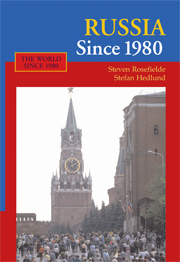Book contents
- Frontmatter
- Contents
- List of Figures, Tables, and Boxes
- Acronyms
- Timeline
- Preface
- Acknowledgments
- Introduction
- PART I RUSSIA BEFORE 1980
- PART II GORBACHEV
- 3 Pandora's Box
- 4 Blindman's Bluff
- 5 Squalid Superpower
- PART III YELTSIN
- PART IV PUTIN
- PART V ADVANCE AND RETREAT
- PART VI PROSPECTS
- Conclusion
- Glossary
- Bibliography
- Index
- References
4 - Blindman's Bluff
Published online by Cambridge University Press: 05 June 2012
- Frontmatter
- Contents
- List of Figures, Tables, and Boxes
- Acronyms
- Timeline
- Preface
- Acknowledgments
- Introduction
- PART I RUSSIA BEFORE 1980
- PART II GORBACHEV
- 3 Pandora's Box
- 4 Blindman's Bluff
- 5 Squalid Superpower
- PART III YELTSIN
- PART IV PUTIN
- PART V ADVANCE AND RETREAT
- PART VI PROSPECTS
- Conclusion
- Glossary
- Bibliography
- Index
- References
Summary
Wishful Thinking
As memories of Sovietology fade, many scholars prefer to forget that they misappraised the motives of those pressing for Soviet regime change and portrayed the Gorbachev years as a time of high hopes. Socialists who kept the faith continued to believe that the future was theirs, that the USSR would eventually realize its ideals. Western optimists of various persuasions likewise were encouraged by Gorbachev's post-1986 democratic and humanistic rhetoric, tiptoe marketization, and most of all by gestures of rapprochement. Although, they grasped many of the Soviet Union's economic shortcomings, most preferred not to consider the possibility that warmer relations might be a subterfuge or sabotaged by stagnation, depression, or collapse. The glasnost (openness) years for them were perceived in accordance with western harmonist public culture as the dawning of a new enlightened age of westernization, arms control, disarmament, peace, and global prosperity. Privateers and catastroika were invisible on their radar screens (see appendix), and even today, the myth of Ronald Reagan's and Gorbachev's epochal, cold war–ending statesmanship distorts reality and overshadows the real drama.
The period of heady optimism began abruptly in 1987 with Gorbachev's declaration of novoe myslenie (new thinking), symbolizing his desire to bury the hatchet with Europe and America on a host of ideological, security, trade, investment, political, and human rights issues. Before 1987, western specialists fretted that uskorenie (GDP growth acceleration) would modernize Soviet weapons technology, intensifying the arms race or that such fears would preclude the Kremlin from gaining the financial assistance it needed to westernize.
- Type
- Chapter
- Information
- Russia Since 1980 , pp. 56 - 77Publisher: Cambridge University PressPrint publication year: 2008

